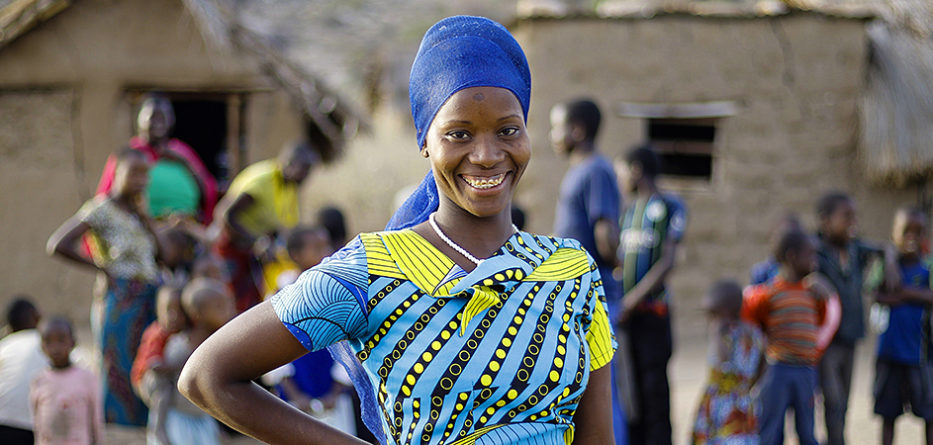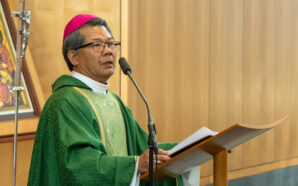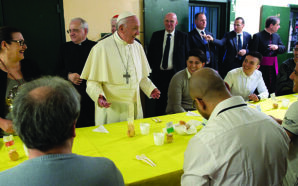For each of the six weeks of Lent, the Diocese of Parramatta is sharing one of Caritas Australia’s feature stories of lives changed through support and empowerment programs.
THIRD SUNDAY OF LENT – 8 March 2021
Oliva, Tanzania
Growing up in Tanzania, 22-year-old Oliva didn’t have the opportunity to go to school. She went through life embarrassed that she was unable to read, write or count. As an adult, her small business lost money because customers were taking advantage of her.
Then Oliva enrolled in literacy and numeracy classes as part of Caritas Australia’s A+ program. Even while she was still learning herself, she decided to set up a classroom in her home so she could share what she was learning free of charge with other women who were too shy to attend public classes.
Now, Oliva has graduated from her classes. Attendance at her home-based classes is growing. Her business is thriving. And she’s fulfilling her dream of becoming a pastor.
Oliva lives in the Arusha region of northern Tanzania with her farmer husband and four children. She has two sons aged seven and two, as well as an adopted niece and nephew who have lived with them since her husband’s brother died seven years ago.
Oliva runs a kiosk, that sells grocery products, and serves tea and snacks. To make ends meet, she also works as a casual labourer on local onion farms.
With little rainfall for around five months a year, many Tanzanians face food shortages and struggle to afford shelter and clothing. Some households survive on just two meals per day that mostly consist of maize, which doesn’t provide a balanced diet.
Oliva’s ability to earn an income was hindered by the fact that she could not read, write or count.
“Due to our low family income, my parents could not send me to school,” Oliva says. “My mother preferred that I take work as a labourer. I felt inferior and didn’t interact with my friends.
“When I went to church and the pastor said, ‘Let us open our Bible and read,’ I couldn’t read a single word. As an adult, people used to take advantage of me because I couldn’t count. I was operating my business at a great loss.”
Around 25% of Tanzanian girls and women over 15 years cannot read or write.[1] Many families are unable to afford school fees or uniforms. Schools are often a long way from home with limited resources, and few teachers willing to work in remote rural areas.
Women in Tanzania also tend to bear the burden of household tasks, with low participation in activities outside the home, and limited decision-making powers within their family and community.
Three years ago, Oliva attended a village meeting about the A+ Program run by Caritas Australia with our local partner, Diocese of Mbulu Development Department (DMDD). This program helps the community to identify its resources and ways they can achieve their vision for a better future.
As part of the program, Oliva started attending Caritas Australia-supported literacy classes in the village. She noticed that other women were interested in the classes, but were too shy and embarrassed to be in the same class as their children.
Even though Oliva was still learning herself, she set up a classroom in her mud house and started passing on her knowledge to her neighbours.
Oliva has now graduated, as have some of her students – and attendance at her classes is growing. Her children are also able to learn in the village, instead of travelling seven kilometres to school.
“Now I can now read my Bible. My students are happy and are highly motivated, as they see me teaching them and believe that one day they will be like me,” says Oliva.
“My business is growing because I can keep my financial records without confusion, and save and buy basic needs like food, medicine and farm materials. Education has also enabled me to come closer to my children, as we do homework together.”
Caritas Australia has also helped the community access safe drinking water, increase livestock production and improve toilets in several primary schools. Around 2,500 people have benefitted from this program so far.
“The effort that Oliva shows in adult learning is an eye-opener to other community members who used to feel inferior after missing primary education,” says DMDD Program Coordinator, Rither Mallewo. “They now believe that working hard pays no matter the challenges. Adult learning classes empower the community as they reveal useful hidden talents.”
Oliva now has ambitions beyond being a teacher. She aspires to ‘Be More’, and also wants to help her community achieve its vision of a better life for all.
“I’m now the women’s chairperson at the church and I want to be a pastor. I will also contest for a leadership position in the next village council election so I can represent my community,” Oliva says.
“I am proud to be a teacher who helps others to achieve their dream. I would like to thank Caritas Australia for your support toward fulfilment of our community vision. May God bless you all.”
To donate to Project Compassion, you can donate through Parish boxes and envelopes, by visiting www.caritas.org.au/projectcompassion or calling 1800 024 413.
With thanks to Caritas Australia.
[1] World Bank https://data.worldbank.org/indicator/SE.ADT.LITR.ZS?locations=TZ








